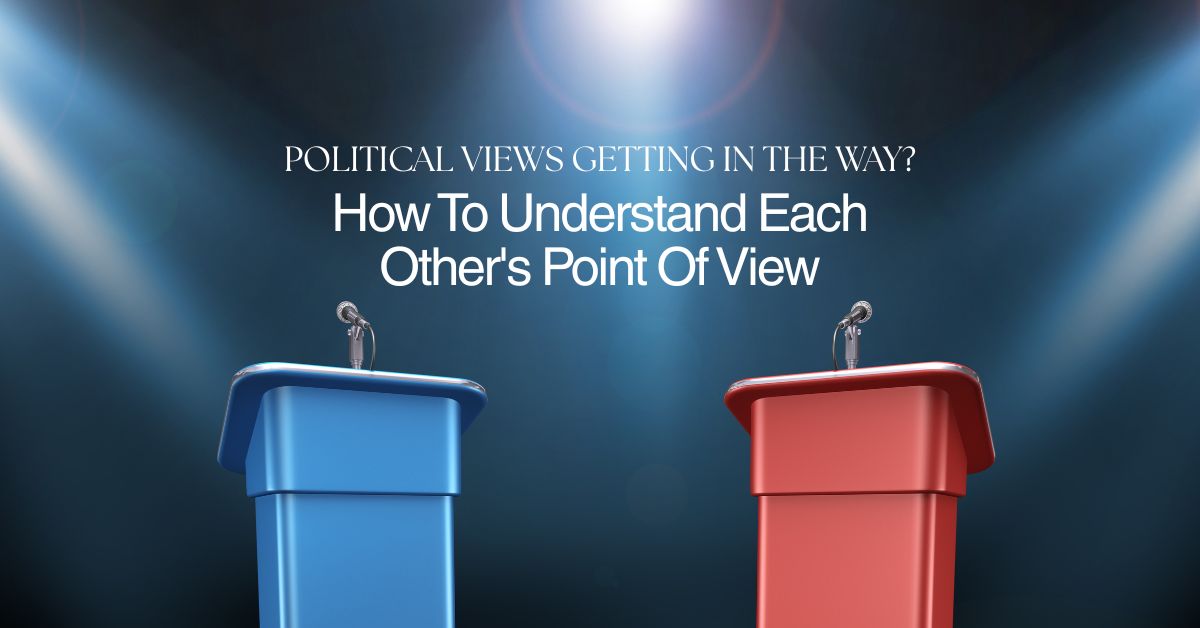
Political Views Getting In The Way? How To Understand Each Other’s Point Of View
For many mature singles navigating the dating world, political differences in dating can become a significant challenge. Within a relationship, political views often reflect deeply personal values, life experiences, and beliefs. These can be polarizing topics if handled poorly, but with effort and mutual respect, political differences don’t have to create unnecessary rifts. Instead, they can serve as an opportunity to strengthen communication and connection.
Below, we explore practical ways to manage political differences in relationships and build bridges of understanding.
Acknowledge And Accept Your Differences
Acknowledging and accepting the reality of differing political views is the starting point for navigating these challenging waters. Pretending differences don’t exist or sweeping them under the rug might seem easier at first, but avoidance often erodes trust in the long run. Openly discussing political differences in a respectful manner helps establish a healthy foundation.
Here’s how you can make this work in your relationship:
- Start with Empathy: Understanding that your partner’s political perspective isn’t born in a vacuum is key. Ask yourself what life experiences, family background, or cultural influences might have shaped their views.
- Focus on the Bigger Picture: Despite disagreeing on specific policies or ideologies, chances are you and your partner likely share common goals, like valuing honesty, family, or fairness. Keep this overarching perspective in mind.
- Be Honest about Your Non-Negotiables: Some issues might strike so deeply that compromise feels impossible. Whether it’s a stance on human rights or fundamental beliefs you hold dear, be open about these early in the relationship. This candor reduces potential misunderstandings later.
- View Your Partner as a Whole Person: Strive to see your partner beyond their political stance. People are multidimensional, and their political beliefs are only one aspect of who they are.
The goal is not to change each other but to create a safe space where both people feel valued and heard. This approach lays the groundwork for mutual respect despite differences.
Build On Shared Values
It’s easy to get caught up in debates over political differences, but relationships thrive when you put more energy into building common ground than highlighting disagreements. Focusing on shared values helps shift attention toward what brings you together rather than what pushes you apart.
Try these practical strategies to reconnect over mutual interests and priorities:
- Identify Shared Hobbies: Whether it’s gardening, cooking, or volunteering, actively participating in something you both enjoy creates positive shared experiences. These moments remind you why you value each other outside of divisive topics.
- Avoid Making Politics the Central Theme: While political differences may naturally arise in conversation, don’t make it the focus of your relationship. Enjoy discussing other areas of interest like travel, books, or aspirations that strengthen emotional intimacy.
- Reinforce Positive Interactions: Celebrate the things you agree on as a couple. For example, perhaps you both value giving back to your community. Channel energy into volunteering or acts of kindness that align with this shared belief.
- Frame Disagreements Productively: Look for the values guiding your differing opinions. For example, a debate about environmental policies might reveal shared concerns about leaving the planet in good shape for future generations.
By channeling attention toward your shared goals, you foster a deeper bond. Acknowledging both similarities and differences sends the message that you value your partner for who they are, regardless of their political views.
Dealing With Conflict During Political Discussions
Even with the best intentions, conflicts surrounding political topics can happen. Strong emotions often surface when discussing values tied to identity or personal beliefs. Learning to manage these moments effectively is crucial to maintaining harmony in the relationship.
Spot Common Triggers
Arguments often arise from seemingly small details. Recognizing these triggers early can help prevent unnecessary escalation. Some known triggers include:
- Overgeneralizations, such as “people who believe X are always wrong”
- Sarcasm and dismissive comments
- Attempting to “win” an argument, rather than seeking understanding
- Misinterpreting each other’s points due to assumptions or biases
- Pressing a topic your partner clearly wants to step away from
Understanding triggers isn’t about avoiding conversations altogether but being mindful of how you approach sensitive subjects.

Practical Tools for Managing Conflict
When heated conversations do emerge, turning the argument into a learning opportunity can strengthen your relationship. Here’s how to stay calm and constructive during difficult discussions:
- Create Clear Boundaries: If political topics put undue strain on your relationship, agree to limits around when and how these topics are discussed. For instance, set aside certain times to avoid these talks entirely, such as during mealtime or vacations.
- Use Neutral Phrasing: Shifting from accusatory language to neutral phrasing avoids putting the other person on the defensive. Instead of “You never listen to my opinion,” try saying, “I feel unheard during these discussions.”
- Take Intentional Breaks: When emotions run high, taking a moment to pause can prevent arguments from spiraling. Agree in advance that it’s okay to step away and revisit the discussion later.
- Validate Each Other’s Feelings: You don’t have to agree with your partner to acknowledge their feelings. A statement such as, “I see why this subject matters deeply to you,” shows care for their perspective.
- Practice Active Listening: Make an active effort to rephrase or summarize what your partner is saying before responding. This clarifies any misunderstandings and demonstrates that you’re truly listening.
Learning to de-escalate conflict preserves the respect and affection needed for a thriving relationship.
Respect As The Foundation For Growth
Respect forms the bedrock of any healthy relationship, especially when facing political differences. When you approach each interaction with thoughtful consideration for your partner’s belief system, you foster an environment where both people feel understood and acknowledged.
Respect doesn’t mean agreeing with everything your partner says. It means honoring their right to have their opinions and values, even if they don’t align with your own. Here’s how respect can show up in daily life:
- Hold Space without Interrupting: Demonstrate respect by allowing your partner to express their views fully without cutting in. It shows you value their input.
- Avoid Mocking or Diminishing Beliefs: Resist the urge to trivialize or poke fun at viewpoints you don’t agree with. This breeds resentment and distance.
- Appreciate Where You’ve Grown Together: Political discussions often serve as chances to gain fresh insights into one another’s experiences. Celebrate how these moments bring depth and nuance to your relationship.
- Commit to Kindness: At the end of the day, acts of kindness can keep a relationship strong despite differences. Little things, like showing compassion when your partner has had a tough day, matter more than political debates.
When respect is mutual and consistent, it allows love to flourish naturally.
Looking Beyond Political Labels
Over time, navigating political differences in dating teaches couples valuable lessons about patience, empathy, and collaboration. The ability to understand and appreciate someone else’s perspective without losing sight of your own strengthens the relationship’s foundation.
Ultimately, political views may help shape who you are but they don’t define your capacity to share a meaningful connection with your partner. When you prioritize kindness, mutual respect, and shared experiences, even the most heated differences can be managed with grace. The face-to-face connection you share will always outweigh any headline or policy disagreement, grounding you in what truly matters—loving one another fully.
This balanced approach ensures both partners feel valued and understood, creating an enduring bond capable of weathering life’s complexities together.











